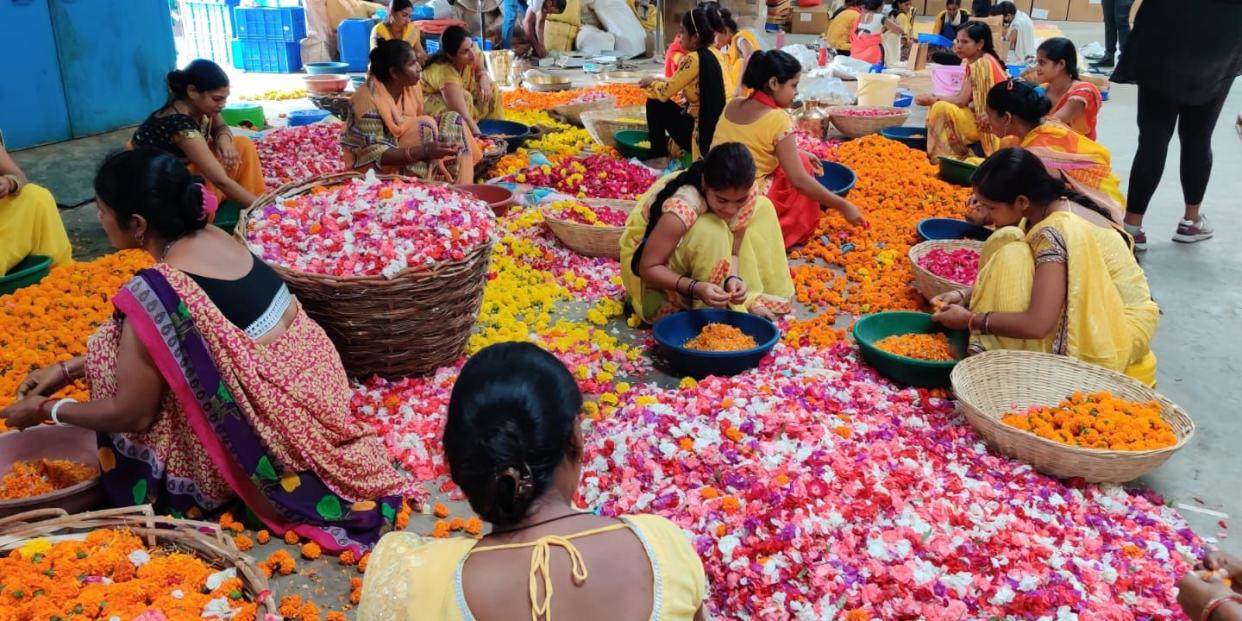Meet The Earthshot Prize Finalist Making a Vegan Leather Out of Flowers

In 2015, Ankit Agarwal was sitting with a friend by the banks of the river Ganges watching people taking a dip during the festival of Makara Sankranti. It sounds like an idyllic scene, but what struck the two young men most was just how dirty the water was in this sacred but very polluted spot.
“My friend started counting, he counted there were 147 people including women and small children taking a dip in the river Ganges. And at that point in time the water was so dirty that we didn’t even want to touch it,” Ankit, now 32, recalls to T&C.
And so started a conversation that would eventually lead to Ankit being announced as one of the 15 finalists in Prince William’s 2022 prestigious Earthshot Prize. Recognized in the Build a Waste-Free World category, Ankit’s company Phool creates an innovative material from waste flowers very similar to leather. He has called it Fleather.
Like many innovations, Fleather evolved out of a process that initially started as something else. Inspired to clean up the river Ganges, Ankit collected used flowers that would otherwise be dumped into the river in droves by temples and pollute the water with pesticides. “Initially I began by converting these flowers into natural charcoal for incense,” he says. Then, one day, he noticed that one of the unused flower piles had developed a mat-like coating. “It had a very strange morphology. I was very intrigued by it…Slowly, slowly, after three years of hard work, we were able to figure out this material behaves exactly like animal leather.”
Realizing that he had struck on something that could be used as an environmentally-friendly version of leather, Ankit grew his idea to the company he has today. Now he employs 163 women to collect flowers and creates 90 square feet of Fleather each day. Cleaned of pesticides then sun-dried before being separated by species, the flowers undergo a process at Phool’s lab in Uttar Pradesh that forms sheets of leather within three weeks.
The fact that he is able to employ women who would otherwise be carrying out work known as manual scavenging, which involves cleaning human excrement, is something that Ankit describes as “the closest thing to my heart.” He hopes, he says, to one day employ 5,000 women full-time and to change the cycle of poverty for their families. “Change will not come in this generation, the change will come when the kids of the women who we employ start going to school and the tag of scavenging goes and they get a proper education,” he says. “And the shackles and the cycles of poverty is broken.”
Fleather has already received recognition, with a contract to supply a brand (details of which Ankit cannot disclose) with Fleather sheets. But he recognizes the Earthshot Prize as a platform that has the power to launch his idea “across the world.”
This year's Earthshot Prize awards will be held in Boston on December 2, and five winners will be chosen to receive £1 million each to advance their innovation. Prince William and Kate will be joined by climate experts and activists, government leaders, business executives, celebrities, and influencers from around the world for the sustainably produced ceremony. This is the second Earthshot Prize following the inaugural event in London last year, and the Prize will be held every year for a decade with the aim of championing 50 innovative solutions to the climate crisis.
You Might Also Like


